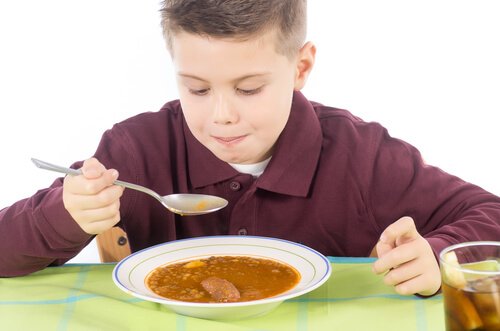Foods to Increase Your Child's Immune System

There are certain foods that can help naturally boost your children’s immune system. They also protect them against school viruses and allow them to grow up healthy.
Nutritional deficiencies regarding proteins, carbohydrates and healthy fats – such as olive oil, fruits and vegetables rich in vitamins A, C, E and D – cause children to have low defenses and not be able to counteract diseases.
With this in mind, we’ll provide you with a complete list of foods to increase your child’s immune system. We’ve also included some very effective and simple recipes.
A balanced diet
Eating a balanced and healthy diet ensures that children have an excellent state of health. Their immune system will be able to effectively fight diseases, especially common viruses going around at school.
When talking about a balanced diet, nutritionists say that consuming all food groups is imperative. Of course, exceptions will be present in children who have particular pathologies, food allergies or food intolerances.
However, a frequently asked question is: what happens to children’s immune systems when they aren’t getting enough nutrients in their diet?
Lack of protein
When children don’t eat enough protein – found in meat, chicken and fish – they show a decrease in the formation of lymphocytes. These are responsible for the optimal functioning of the immune system.
Lack of carbohydrates
Carbohydrates are present in products such as rice, pasta, flour, cereals and potatoes. These foods are responsible for providing energy, so they’re necessary for the body’s defenses.

Lack of fat
When nutritionists recommend that children eat fat, they always clarify the type of fat they can ingest. While the absence of a certain food can harm children’s immune system, eating a poor-quality product can also threaten them.
This is what happens regarding fats. If the child eats saturated fats that come from pastries, sausages or trans fat, there will be an almost immediate and considerable decrease in the child’s immune system.
The only fats recommended for children are those containing omega 3. This is found in olive oil or in fruits such as avocado.
Lack of vitamins from fruits and vegetables
Of all the food groups, the one that provides the most vitamins and minerals are fruits and vegetables. When a child doesn’t ingest them in a large enough amount, his or her health is affected in all aspects, and the immune system cells are oxidized.
While the lack of a certain food can harm children’s immune systems, eating a poor-quality product can also threaten them.
Foods to increase your child’s immune system
The foods that contribute the most to increasing children’s immune system are those that contain vitamins A, E, C, and D, as well as minerals iron and zinc. Some of the most prominent are:
- Carrots
- Broccoli
- Chard
- Pumpkin
- Avocado
- Orange
- Apple
- Lemon
- Kiwi
- Papaya
- Grapefruit
- Oats
- Lettuce
- Honey
- Nuts
- Eggs
- Vegetables
- Salmon
- Tuna
- Prawns

Recipes to increase your child’s immune system
Making sure our children are eating enough fruits and vegetables can be difficult. However, we can prepare drinks that incorporate several beneficial ingredients for their health, using our children’s favorite flavors.
The most powerful juice mixes for increasing a child’s immune system are:
- Strawberry, orange and guava
- Apricot, orange and grapes
- Currants, spinach and oranges
- Currants, lemon and apple
- Pumpkin and carrot
- Orange and carrot
- Cold or hot lemonade with honey
- Apple, ginger and parsley
- Apple, lettuce and sesame seeds
- Pineapple and almonds
- Strawberry and mango
As a final recommendation, remember that children should consume at least two servings of fruits and vegetables a day, especially citrus fruits such as oranges, lemons and tangerines, which are rich in vitamin C.
It’s also important to consume nuts, yogurt, honey, cereals, meats and legumes at least twice a week.
All cited sources were thoroughly reviewed by our team to ensure their quality, reliability, currency, and validity. The bibliography of this article was considered reliable and of academic or scientific accuracy.
- Asociación Española de Pediatría. (10 de noviembre de 2019). Nuevas recomendaciones de consumo de pescado de la Agencia Española de Seguridad Alimentaria y Nutrición. Consultado el 7 de julio de 2023 https://www.aeped.es/comite-nutricion-y-lactancia-materna/nutricion-infantil/noticias/nuevas-recomendaciones-consumo-pescado
- Belkaid, Y., & Hand, T. (2014). Role of the microbiota in immunity and inflammation. Cell. 157 (1): 121-141. https://www.ncbi.nlm.nih.gov/pmc/articles/PMC4056765/
- Childs, C. E., Calder, P. C., & Miles, E. A. (2019). Diet and immune function. Nutrients. 11 (8): 1933. https://www.ncbi.nlm.nih.gov/pmc/articles/PMC6723551/
- Harvard T. H. Chan. School of Public Health. (s.f.). Nutrition and immunity. Consultado el 7 de julio de 2023. https://www.hsph.harvard.edu/nutritionsource/nutrition-and-immunity/
- Healthychildren.org. (19 de agosto de 2022). Nuestra posición con respecto al jugo o zumo de fruta para niños. Asociación Americana de Pediatría. Consultado el 7 de julio de 2023. https://www.healthychildren.org/spanish/healthy-living/nutrition/paginas/where-we-stand-fruit-juice.aspx
- Mazziotta, C., Tognon, M., Martini, F., Torreggiani, E., & Rotondo, J. Ch. (2023). Probiotics mechanism of action on immune cells and beneficial effects on human health. Cells. 12 (1): 184. https://www.ncbi.nlm.nih.gov/pmc/articles/PMC9818925/
- McCarthy, C. (12 de octubre de 2021). Boosting your child’s immune system. Harvard Health Publishing. Harvard Medical School. Consultado el 7 de julio de 2023. https://www.health.harvard.edu/blog/boosting-your-childs-immune-system-202110122614
- National Institutes of Health. (15 de junio de 2022). Vitamin A and carotenoids. Consultado el 7 de julio de 2023. https://ods.od.nih.gov/factsheets/VitaminA-HealthProfessional/
- Segurola Gurrutxaga, H., Cárdenas Lagranja, G., & Burgos Peláez, R. (2016). Nutrientes e inmunidad. Nutrición Clínica en Medicina. 10 (1): 1-19. https://www.studocu.com/es-mx/document/universidad-autonoma-de-la-ciudad-de-mexico/nutricion/5034-articulo-cientifico/55700189
- Valeur, J., Puaschitz, N., Midtvedt, T., & Berstad, A. (2016). Oat porridge: impact on microflora-associated characteristics on healthy subjects. Brisitsh Journal of Nutriton. 115 (1): 62-7. https://pubmed.ncbi.nlm.nih.gov/26511097/
- Verduci, E., & Köglmeier, J. (2021). Immunomodulation in children: the role of the diet. Journal of Pediatric Gastroenterology and Nutrition. 73 (3): 293-298. https://www.ncbi.nlm.nih.gov/pmc/articles/PMC9770123/
This text is provided for informational purposes only and does not replace consultation with a professional. If in doubt, consult your specialist.
